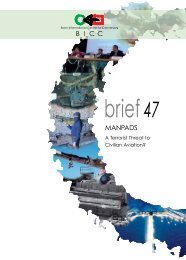egypt-final-presidential-elections-2012
egypt-final-presidential-elections-2012
egypt-final-presidential-elections-2012
You also want an ePaper? Increase the reach of your titles
YUMPU automatically turns print PDFs into web optimized ePapers that Google loves.
The Carter Center<br />
Presidential Election in Egypt<br />
Polling and Voting Operations 152<br />
Access to Polling Centers: Polling centers were<br />
generally considered accessible and free of interference,<br />
with good queue management outside the<br />
center, for both rounds of polling. During the first<br />
round of voting, however, witnesses reported that in<br />
approximately 10 percent of polling stations visited,<br />
they encountered active campaigning. During the<br />
second round of voting, this dropped to less than<br />
5 percent of stations, perhaps partially reflecting the<br />
fact that there were only two candidates contesting<br />
the second round vote.<br />
Candidate Agents and Domestic Witnesses: The<br />
presence of candidate agents was reported in nearly all<br />
polling stations during opening, polling, and closing<br />
during both rounds of voting. 153 Egypt respected and<br />
fulfilled its obligation to protect the right of candidates<br />
to be represented<br />
at polling stations by<br />
duly appointed agents,<br />
an essential safeguard for<br />
transparency. 154 However,<br />
the low representation of<br />
domestic witnesses was<br />
notable. Carter Center<br />
witnesses reported seeing<br />
their domestic counterparts<br />
in about 10 percent of polling stations visited in<br />
the first round, with even a lower percentage present<br />
during the second round.<br />
Few restrictions were placed on candidates’<br />
agents and witnesses at polling stations. There was<br />
a small minority of polling stations in which the<br />
judge or security officials blocked agents or witnesses<br />
from fulfilling some of their duties or engaged in<br />
intimidation.<br />
Infrequent yet persistent interference by candidate<br />
agents in the electoral process was cause for concern.<br />
Although the general trend of uninterrupted access<br />
and robust participation of candidate agents in the<br />
electoral process was positive, more attention should<br />
be paid to candidate agents’ own interference with<br />
the process. Carter Center witnesses reported that<br />
53<br />
Poll workers check for a voter’s name on the list on<br />
June 16, <strong>2012</strong>.<br />
Polling centers were generally considered<br />
accessible and free of interference, with<br />
good queue management outside the<br />
center, for both rounds of polling.<br />
in almost 5 percent of the polling stations visited,<br />
the candidate agents inappropriately performed some<br />
of the duties of the pollworkers, such as applying<br />
seals to ballot boxes,<br />
carrying ballot boxes, and<br />
providing voter information<br />
in polling stations. It<br />
should be noted that this<br />
interference did not seem<br />
intended to obstruct the<br />
process and, in no case,<br />
was alleged to constitute<br />
attempted electoral fraud.<br />
Yet it is important that<br />
electoral administration activities are carried out<br />
only by election staff, an important safeguard that<br />
promotes confidence for the electorate in the independence<br />
and competence of election authorities.<br />
152 During the <strong>elections</strong>, there were widespread media reports that<br />
security forces were voting illegally, that pens with magic or invisible ink<br />
were being used during the second round to invalidate votes or to allow<br />
multiple voting, and that pre-marked ballots were being issued to voters.<br />
The Carter Center mission has no evidence that these alleged incidents<br />
occurred or had any impact on the results of the election.<br />
153 During polling across the two rounds, candidates’ agents were not<br />
present in less than 5 percent of polling stations visited by Carter Center<br />
witnesses. During the second round of voting, Carter Center witnesses<br />
reported that 98 percent of stations visited had at least one Morsi<br />
candidate agent, and 84 percent had at least one Shafiq candidate agent.<br />
154 AU, African Union Declaration on the Principles Governing<br />
Democratic Elections in Africa, Article 7<br />
Maurice Chammah



